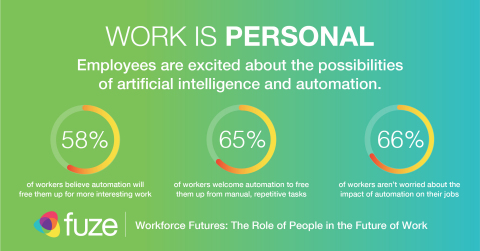TMCnet News
Workforce Futures: Fuze Global Study--Taking the 'Hours' Out of Business Hours is the Key to Productivity and Work-Life BalanceFuze, the leading cloud-based communications platform provider for the modern global enterprise, today published a new global study, which reveals that employees no longer want set working hours, office walls, or company structures. Instead, workers are adopting a 'work-as-a-service' approach, switching into and out of "work mode" at the touch of a button and at the times and locations that suit them. This press release features multimedia. View the full release here: https://www.businesswire.com/news/home/20180515005262/en/ 
Workforce Futures: Fuze Global Study--Taking the 'Hours' Out of Business Hours is the Key to Productivity and Work-Life Balance (Graphic: Business Wire) The Fuze report, "Workforce Futures: The role of people in the future of work," incorporates a global survey of 6,600 employees working in enterprises of more than 500 people from Australia, Canada, France, Germany, the Netherlands, Scandinavia, Spain, the UK, and the USA. The survey results present unique insights from international academics, futurists, and industry evangelists. It reveals that while 66 percent of workers don't feel pressured to work outside of their contracted hours, 73 percent prefer to do so because it is when they are more productive. Nine out of ten employees also believe that flexible hours should be a workplace norm rather than a benefit. For more than alf of employees, this issue is so important that they would rather quit their jobs than lose the ability to work flexibly. "The communications and collaboration market is experiencing a major shift in digital transformation. Our research has uncovered this shift, which is set to shape the future of work as digital workers break free from rigid hours and move fluidly in and out of 'work mode' at the push of a button," said Colin Doherty, CEO, Fuze. "For enterprises, this is about allowing employees to work when they are the most productive and giving them every opportunity to balance personal commitments and attain a work-life balance. Enabling employees to work when and where they want, while equipping them with the right technology, results in a happier workforce with low churn and high-performing teams." The Fuze report uncovered three key trends:
"The very nature of work is changing with significant growth in non-routine work over the last 30 years-especially project work-coupled with the technology-accelerated pace of business," said Sophie Wade, Workforce Innovation Specialist, Flexcel Network. "This is dramatically changing employers' emphasis on their talent and their need for workers to be flexible and adapt to the evolving marketplace. Leading corporations are recognizing that to achieve greater employee responsiveness, they must engage workers more, and discover when, where, and how they work best, as well as promote open mindsets. Increasingly aligned with employees' desires for new ways of working, competitive employers are seeking to discover each person's optimal work conditions so they can be as productive as possible." For the full report: "Workforce Futures: the role of people in the future of work," please click here.
About Fuze
View source version on businesswire.com: https://www.businesswire.com/news/home/20180515005262/en/ |

